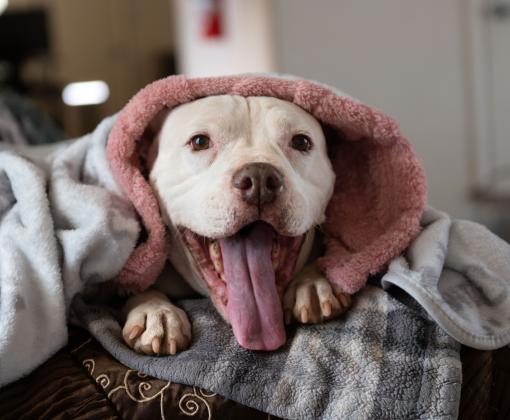
Rabbit Spay/Neuter: What to Know
The reason to spay or neuter rabbits is obvious if you have both a male and a female bunny. (Remember the old adage about breeding like rabbits!) But should you spay a female rabbit or neuter a male rabbit if you have only one — or if you have several of the same sex? Here's what you need to know about pet rabbit spay/neuter.
Reasons to spay or neuter a bunny
Studies indicate that a high percentage of unspayed female rabbits will get uterine and/or ovarian cancer between 2 and 5 years old. And a high number of unneutered male rabbits will get testicular cancer. So spaying or neutering can give your pet rabbit a longer life span — potentially around eight to 12 (or more) years.
Moreover, upon reaching sexual maturity, rabbits often display such undesirable behaviors as spraying, chewing, and fighting with other rabbits, as well as becoming aggressive toward people. Spaying or neutering greatly reduces — and in many cases eliminates — these behaviors.
At what age should a rabbit be spayed or neutered?
The best time to spay or neuter rabbits is just as soon as they reach sexual maturity, which can be as young as 3 months old in dwarf rabbits. Be sure to double-check your rabbit’s sex beforehand. Most young rabbits can be spayed between 3 and 6 months old.
Is a rabbit ever too old to be spayed or neutered?
The answer to this question really depends on the general health of the bunny in conjunction with the bunny’s age. A younger rabbit with significant medical problems might be more of an anesthetic risk than an older rabbit who’s healthy (although all anesthesia poses some risk). Discussing your rabbit’s individual health history with your veterinarian is the best way to make a decision about whether your rabbit can undergo the procedure.

See how your community is doing
Choosing a veterinarian
It is extremely important to make sure that your vet is knowledgeable about the spay/neuter procedure and experienced with both the procedure and rabbits in general. A rabbit neuter or spay surgery can be dangerous or even life-threatening if improper technique is used. If the rabbit is older, tests might need to be done to assess liver and kidney function prior to surgery.
Please question the vet carefully about their experience with rabbits before you take your bunny in for surgery. The House Rabbit Society keeps a list of experienced rabbit vets.
Cost of spay/neuter surgery for bunnies
The cost to perform spay or neuter on a bunny is quite variable. But it does tend to be slightly higher than the cost for a dog or cat because the surgery is a bit more specialized. Check with your veterinarian or your local humane society to determine what the cost will be. You can also contact rabbit rescue groups in your area to see whether they have additional information or can help defray the cost.
About the sterilization surgery
Contrary to the procedure with other animals, food and water should not be withheld from a rabbit the evening before surgery. If the veterinary office staff directs you to withhold food, discuss the request with your vet. Generally, the reason that food is withheld from cats and dogs is the possibility of vomiting during surgery. But rabbits cannot throw up, so vomiting is not a danger with them. In fact, withholding food and water is harmful to rabbits and can result in a longer recovery time from surgery.
The actual surgery involves removal of the ovaries and double uterus in a female and removal of the testes in a male. All large blood vessels are carefully tied off with suture to prevent bleeding, and the incision is closed in layers with buried suture to prevent chewing after recovery.
During anesthesia and surgery, it is important to maintain the bunny’s body temperature. Heating pads, warm IV fluids, warmed or humidified anesthetic gases, and radiant heat are common and effective methods. Plastic bubble wrap (for warmth, insulation, and soft bedding) is also used.
Recovery after the procedure
To assist with the recovery process, the rabbit should be encouraged to eat soon after awakening from surgery. Offer the bunny a variety of favorite fresh foods. Any rabbit who’s not eating soon after surgery might need to have some help with feeding (such as syringe feeding, unless there is a medical reason to avoid this).
If all goes well, your bunny will start to perk up noticeably by the second day after surgery. Healing begins quickly; adhesions (normal tissue repair) usually start to form within 24 hours of surgery in rabbits. Recovery time will depend on the type of surgery, the surgeon's technique, and any complications. In the case of spay/neuter, a male will usually recover more quickly because a neuter is less invasive than a spay. A male is usually ready for normal activity within a few days of surgery; a female might take a bit longer to recover from her spay surgery.
Post-operative pain relief will also help your bunny recuperate faster, as pain can be a cause of post-operative gastrointestinal tract issues. Nonsteroidal anti-inflammatory drugs (NSAIDs) are easy to administer and well tolerated by most rabbits. Other medications (such as opiates) can also be used; although it is often suggested that these drugs can affect gastrointestinal motility, this is uncommon when an animal is truly in pain. Your veterinarian will advise you about which pain medication to use and what dose to give your bunny.
